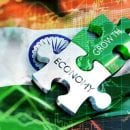Why Technology-Driven Vaccination Does Not Work For India?

Countries worldwide are making use of software to streamline a Covid-19 vaccine drive. India is no different. However, what has made it different is the seemingly horrible software glitches that the system has been showing up in the last few days.
India plans to carry out one of Asia’s most ambitious inoculation programmes. It has plans of inoculating some 300 million people by August 2021. At the moment, the Centre’s focus is on the 30 million support staff workers. For all this, it is making use of the software programme Co-WIN.
However, the website and technology associated with it has not come up to everyone’s expectations. The technical glitches it is posing has led to massive delays in overall national schedules.
Co-WIN is supposed to handle everything– from registrations, to creating vaccination schedules, to informing the recipients about schedules through text messages, to sending people to the right vaccination center and creating a vaccination certificate after those vaccinated have received two doses. Everyone without exception is supposed to self-register on the software that is available through a mobile application.
But now, people are taking things in their hands. For example, AIIMS is using the conventional system of getting into line, encouraging those doctors who know they have registered online, to come forward, get their name written and get themselves vaccinated.
India has carried on massive tasks of vaccinations in the 80s and 90s and all that without the use of swanky technological software. As per doctors who have been administered, India will need to go back to conventional methods to collect data and get the vaccine campaign going. It is definitely going to be faster than the pace it is at right now. The conventional method meant going door to door, signing people up. The website and app would work only well for mobile literate users in the urban cities.
But owing to the glitches in the technology of false messages, or messages to the wrong recipient, it cannot be trusted in urban cities either. And then there are data privacy issues with the app as well. India’s data protection services are not as robust as they should be, is the concern of many.
Digital policy experts say using an app for the vaccination drive reflects India’s love of techno-solutionism but is fraught with potential difficulties. “It’s not easy to make an app-only solution when the infrastructure is not good—people not only need mobile phones, they need connectivity, internet, they need to be able to use the phone,” says Shweta Mohandas, a policy officer at the Centre for Internet and Society, a think tank. “Especially with regard to medical services, it’s dangerous to have it just on an app … it limits the number of people who can use it.”



